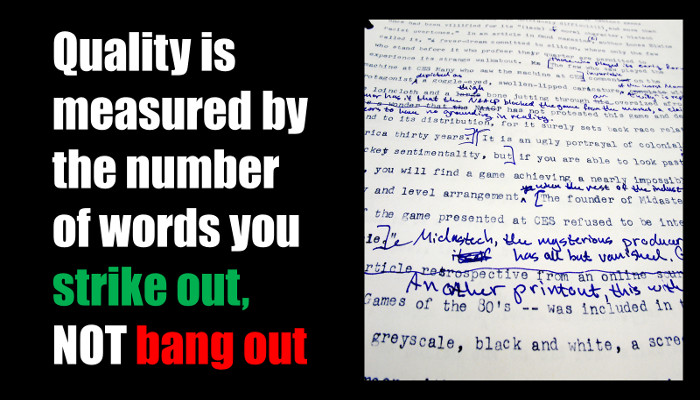
I learned a valuable writing lesson from a movie scene of Ernest Hemingway staring at the blank page. A piece of cardboard with handwritten numbers leans against the wall behind his typewriter. After an awkward moment, Hemingway pencils a zero onto the cardboard. As the camera pulls away, we see that it’s the third consecutive day with a zero. One of the world’s greatest writers reminds us that writing is a marathon instead of a sprint.
But, that’s not what I’ve been seeing recently, as more and more social media posts describe how someone “banged out” ten-thousand words of their next book over the the course of a weekend. Most of these posts are subsequently rewarded with dozens of congratulations for the accomplishment. This may sound curmudgeonly, but what exactly did they accomplish? It’s like congratulating someone for completing a marathon without doing any training. While it’s possible to complete all 26 miles untrained, it’s impossible to do it well.
Banging out ten-thousand words is an accomplishment, it just isn’t the accomplishment. Every good writer knows that those first 10,000 words will contain something like 2,500 nuggets of gold hidden among 7,500 pieces of iron pyrite. And the only way to separate them? Through the hardest part of writing: editing. Magic happens in the editing.
I’ve been working on a manuscript for over a year. Last weekend, I wrote 5,000 words, yet the word count on Sunday evening was actually smaller than the word count on Saturday morning. If I only measured my writing productivity through word count, last weekend would have been considered an #EpicFail.
But, that’s not my goal. My readers don’t care about how many words I’ve “banged out.” They only care about the ones that survived many rounds of ruthless editing.
It’s not the amount of words you write. It’s about the amount of words you keep.
Photo Credit: mpclemens published the image, A lot of ink spilled, through CC BY 2.0.